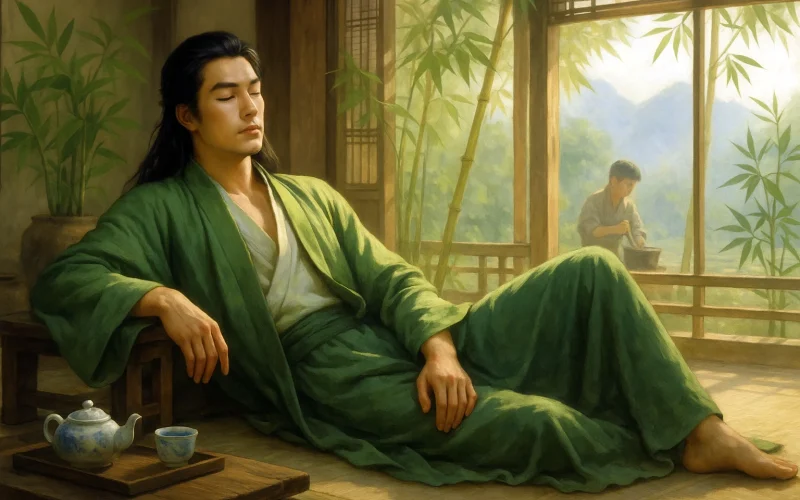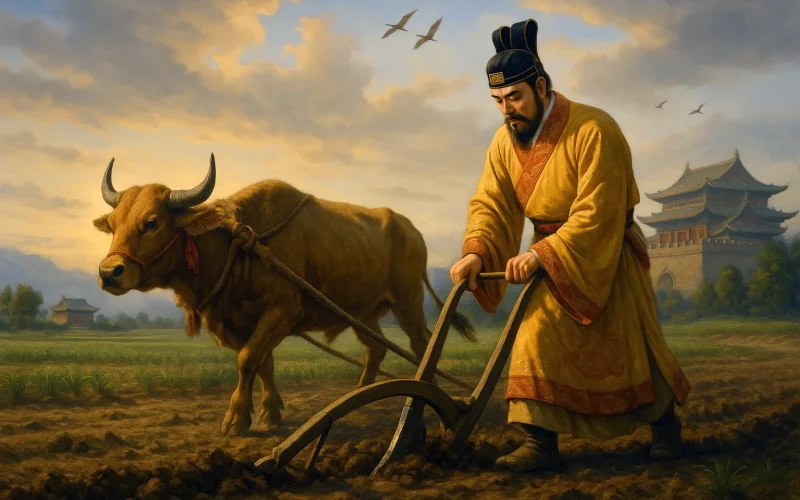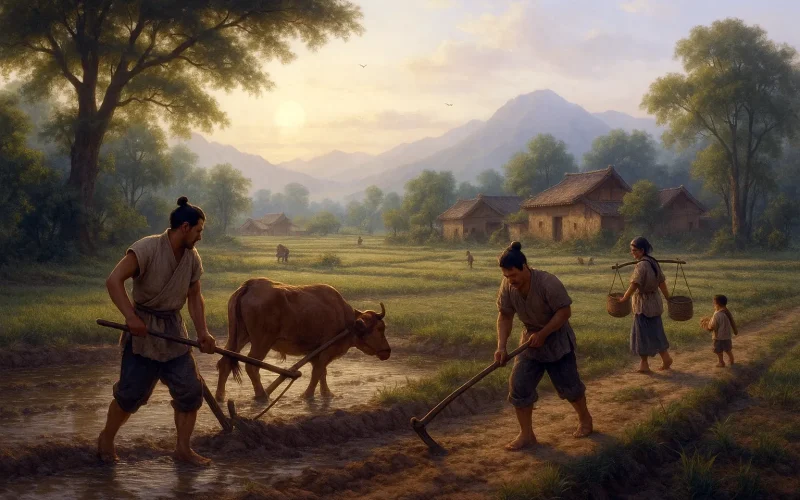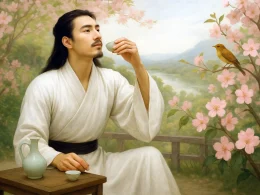Southern heat thick as vintage wine,
I doze by the north window—sleep divine.
Noontide wakes me to silence deep,
Through bamboo—a boy pounds tea, soft and sweet.
Original Poem
「夏昼偶作」
柳宗元
南州溽暑醉如酒,隐几熟眠开北牖。
日午独觉无馀声,山童隔竹敲茶臼。
Interpretation
This poem was composed during Liu Zongyuan's exile in Yongzhou. In the first year of the Yongzhen era (805 AD), the thirty-three-year-old Liu Zongyuan, having participated in the failed "Yongzhen Reforms," was demoted from a vice-director in the Ministry of Rites to a minor military official in Yongzhou. This political disaster cast him to the margins of society and fundamentally altered the course of his life—from the heights of the court to the remoteness of the rivers and lakes, from the center of power to the desolate southern wilds.
Yongzhou was located in southern Hunan, its summers muggy and oppressive, utterly different from the dry coolness of the north. The newly arrived Liu Zongyuan had to endure not only the mental anguish of political failure but also the physical torment of adapting to the southern "dank summer heat." This poem captures a fragment of life on just such a summer afternoon: overcome by the heat, he opens the north window and dozes off leaning on his desk; upon waking, all is silent except for the sound of a mountain child pounding tea beyond the bamboo grove. This seemingly leisurely, ordinary moment subtly contains the loneliness of exile and a deep observation of common life. That single sound of "pounding the tea mortar" is both a real sound of mountain life and, like a knock, strikes the poet's sensitive heart.
First Couplet: "南州溽暑醉如酒,隐几熟眠开北牖。"
Nán zhōu rù shǔ zuì rú jiǔ, yǐn jī shú mián kāi běi yǒu.
The Southland's dank summer heat, it drugs me like strong wine;
I doze, head on my desk, the north casement open wide.
The opening uses a striking metaphor to describe the southern heat. "Dank summer heat" refers to the muggy, humid weather typical of the south; "drugs me like strong wine" transforms a physical sensation into a psychological experience—the mugginess is not simply heat, but like drunkenness, making one dazed, lethargic, and mentally foggy. This word "drugs/drunken" ("醉") describes both the fierceness of the heat and hints at a certain mental disorientation in the poet's state following his exile: was he not also in a kind of life "drunkenness"?
The second line describes the poet's way of coping with the intense heat: opening the north window for a draft and falling into a deep sleep leaning on his desk. "Head on my desk" ("隐几") describes the posture of leaning on a small table, conveying a sense of leisure and languor; "doze… deep" ("熟眠") describes the depth of sleep, caused both by heat-induced fatigue and having nothing to do. This line depicts a daily routine, yet reveals the idleness of exile—a once reform-minded official could now only doze off in the afternoon heat.
Second Couplet: "日午独觉无馀声,山童隔竹敲茶臼。"
Rì wǔ dú jué wú yú shēng, shān tóng gé zhú qiāo chá jiù.
At noon I wake alone; no other sound remains;
A mountain lad pounds tea where bamboo screens the lanes.
This couplet is the poem's finishing touch, using sound to convey silence, using movement to set off stillness. "At noon I wake alone" specifies the time—noon, the hottest and quietest moment of the day. "No other sound remains" completely captures the surrounding silence—no carriage clamor, no human voices, not even the sound of wind seems to have ceased. This silence is both an environmental reality and a reflection of the poet's inner state: isolated from mainstream society, placed in a near-vacuum of silence.
Yet within this absolute silence comes the sound of "A mountain lad pounds tea where bamboo screens the lanes." "Pounds tea" is the clear, rhythmic sound of preparing tea; "where bamboo screens" ("隔竹") indicates distance and adds a hazy quality to the sound. This single strike breaks the silence, yet does not shatter it—instead, it makes the silence more palpably clear, waking the poet from his dream and making him realize: in this silent afternoon, someone (the mountain lad) is still laboring without cease.
It is worth noting that "mountain lad" is a child of the hills, a member of the laboring folk. He does not rest because of the heat but continues toiling for his livelihood. The poet, as an exiled official, though in straitened circumstances, still has the means to "doze, head on my desk." This sound of pounding tea inadvertently creates a contrast between two states of existence: one, a scholar waking from a nap; the other, a child laboring diligently; one savoring solitude in stillness, the other continuing life in motion. The poet does not state this explicitly, but the contrast naturally emerges, infusing the poem with deeper meaning.
Holistic Appreciation
This short poem of only twenty-eight characters contains rich layers within an extremely concise frame. The first line describes the heat, using the "drugs me like strong wine" metaphor to psychologize a physical sensation. The second line describes sleep, sketching the poet's languid afternoon state with "doze, head on my desk." The third line describes waking, creating absolute silence with "no other sound remains." The final line describes the sound, using "pounds tea" as the finishing touch, bringing the entire scene to life.
The poem moves from inner to outer, from stillness to movement. The first two lines are the poet's own state—hot, weary, asleep. The last two are the poet's perception upon waking—silence, sound, thought. And that single "pounds tea" is both literal description and symbol: it breaks the afternoon silence, and it breaks a certain numbness within the poet's heart; it wakes the poet from his stupor, and makes him aware of the subtle connection and distance between himself and the "mountain lad."
Liu Zongyuan offers not a single line of commentary in the poem, yet lets the reader sense his complex mood: a resigned acceptance of exiled life, a keen observation of the people's hardships, and a certain self-mockery regarding his "idle" status. This subtle technique of using scene to convey feeling, sound to transmit meaning is precisely the brilliance of Liu Zongyuan's poetry.
Artistic Merits
- Striking Metaphor, Vivid Sensation: "drugs me like strong wine" captures the muggy heat of a southern summer with penetrating accuracy, making the reader feel it personally.
- Using Sound for Silence, Movement and Stillness Intertwined: The final line, "A mountain lad pounds tea where bamboo screens the lanes," uses a single strike to set off the afternoon silence, making the quiet scene even more profound.
- Implicit Contrast, Meaning Beyond Words: The implicit contrast between the poet's leisurely nap and the mountain lad's arduous labor is understated yet thought-provoking.
- Simple Language, Deep Artistic Conception: The entire poem uses no obscure words or phrases, speaking plainly, yet contains rich psychological depth and social concern.
Insights
This poem first enlightens us about the ability to discover the extraordinary within the ordinary. A summer afternoon, waking from a nap, the sound of tea being pounded—these utterly commonplace fragments of life become, under Liu Zongyuan's brush, a work passed down through the ages. This tells us: Poetry is not somewhere far away; it is in the subtle details of daily life. As long as we feel and observe with care, the most ordinary moments can contain the deepest emotions.
The sound of "A mountain lad pounds tea where bamboo screens the lanes" also makes us contemplate the dialectical relationship between sound and silence. The poet uses a single strike to highlight the absolute silence of the afternoon; and this silence is precisely the externalization of the poet's inner loneliness. In the clamor of modern life, we often fear silence, filling time with all kinds of noise. But Liu Zongyuan's poem reminds us: Silence is not emptiness; it is the space that allows the heart to settle. Only in silence can we truly hear our own heartbeat, and also hear the deeper meaning of that distant "pounding tea."
The poem also enlightens us to pay attention to those overlooked people. The "mountain lad" is only a fleeting image in the poem, without face, without words, only the sound of pounding tea. Yet it is precisely this blurred figure that gives the entire poem its depth—it reminds us that beyond the poet's leisurely nap, people are still laboring; beyond the scholar's spiritual world, there is the material life of the common folk. Liu Zongyuan does not elaborate, but this single strike is enough to make the sensitive reader aware of the contrast between two states of existence and the social implications behind this contrast.
That keen sensitivity and warmth maintained even in hardship within the poem is especially moving. Liu Zongyuan, exiled to Yongzhou, had ample reason to be despondent, numb, and resentful. But he was not; he still maintained a keen sensitivity to the world—he felt the physical sensation of "dank summer heat, it drugs me like strong wine," he heard the sound of "a mountain lad pounds tea," and from this sound he perceived another kind of life. This ability to keep the senses open and remain connected to the world even in suffering is the best defense against despair. It reminds us: no matter the circumstance, do not close off your senses, do not stop feeling and caring for the world.
About the Poet

Liu Zongyuan (柳宗元, 773 - 819), a native of Yuncheng in Shanxi province, was a pioneering advocate of the Classical Prose Movement during China's Tang Dynasty. Awarded the prestigious jinshi degree in 793 during the Zhenyuan era, this distinguished scholar-official revolutionized Chinese literature with his groundbreaking essays. His prose works, remarkable for their incisive vigor and crystalline purity, established the canonical model for landscape travel writing that would influence generations. As a poet, Liu mastered a distinctive style of luminous clarity and solitary grandeur, securing his place among the legendary "Eight Great Masters of Tang-Song Prose" - an honor reflecting his enduring impact on Chinese literary history.












